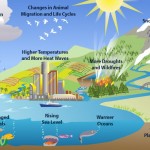A Brief Introduction to the COP21
COP21: A Brief Introduction
History of the COPs
The United Nations Framework Convention on Climate Change (UNFCC) is an environmental treaty that was originally negotiated at the 1992 Earth Summit in Rio de Janeiro. Its aim was to implement an international policy to stabilize greenhouse gas concentrations in the atmosphere and thus prevent harmful human intervention with the climate system. However, the treaty, which was signed by 154 nations, was more of a framework for negotiation and did not set any real limits or enforcement mechanisms to reduce atmospheric concentrations of greenhouse gases.
Since the signing of the treaty, parties to the UNFCC have met annually at Conferences of the Parties – COPs – to consider how to accomplish the treaty’s goals. Since deciding that its initial aim of stabilizing emissions at 1990 levels by the year 2000 was not adequate enough, the parties have established a series of commitments, including:
- Kyoto Protocol (2005), the UNFCC’s most important body of work, whose second commitment period will expire in 2020
- Bali Action Plan (2007)
- Copenhagen Accord (2009)
- Cancun Agreements (2010)
- Durban Platform for Enhanced Action (2012)
Criticism of the COP Process
The COP parties have been criticized for not having achieved the goals stated in the Kyoto Protocol of reducing carbon dioxide emissions. Because the negotiations are governed by consensus and because of the large number of countries implicated in the framework, even a small group can halt progress.
For example, the United States never ratified the Kyoto Protocol because it did not include developing countries, some of which have now become the greatest carbon dioxide emitters. However, the concept of historical responsibility considers the fact that the high percentage of emissions dating from the time of industrialization came mainly from developed countries. Canada also withdrew from the Kyoto Protocol in 2011, fearing that forcing environmental penalties upon citizens would lead to the departure of wealth.
The COP21
The COP21 will be held in Paris, France from November 30th to December 11th 2015. The overarching goal of the Convention will be to achieve, after 20 years of international negotiations, a transparent policy plan reduce greenhouse gas emissions to limit the increase of the global temperature to 2° Celsius above its current level. Although the 2014 edition of the COP has not yet been held (it will take place in Lima, Peru this December), Ban Ki-moon, Secretary-General of the United Nations, has already focused his attention more towards the COP21 in Paris.
For this edition of the COP, negotiations are particularly important, as they will focus on the expiration of the Kyoto Protocol, which has been problematic since its conception in terms of establishing deadlines for environmental benchmarks. With the advancement of sustainability technologies, the redrafting of a protocol with re-negotiated policy targets will represent a huge evolution, because the participating parties have not committed to any action or agreement past the year 2020.
Why is climate change so important at a political level?
Although is it scientific in nature, climate change has potentially disastrous consequences beyond the environment, including on economic development, demographic control, sustainable development, poverty and resource and population management. Implementing effective and universal policies to reduce emissions is a necessary response to climate change.
Thus, by taking on the role of leading the COP21, France hopes to take on a role as a leader in environmental policy, marking what could be a major accomplishment in Francois Hollande’s presidential legacy.


